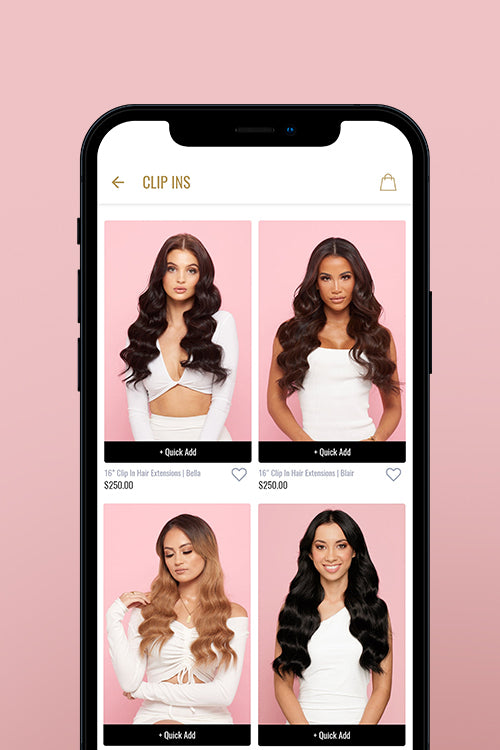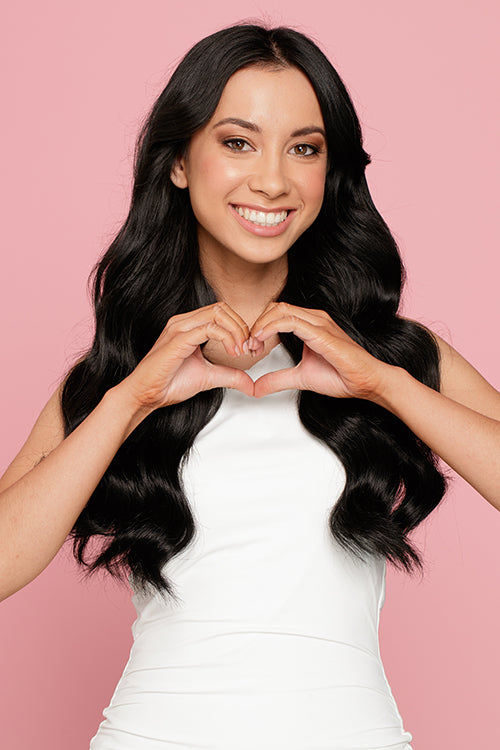Is Silicone Bad For Your Hair Extensions?

A question that you will find varying answers to depending on who you're asking is if silicone is bad for your hair extensions and hair? There isn't a yes or no answer however it's more of an answer that requires knowing which type of silicone products to use and what ones not to use.
What Is Silicone?
We've all heard of the ingredient and you'll find that it's in many hair care products, especially ones that are designed to make your hair appear shiny and smooth. You'll find silicone commonly in shampoos, conditioners to hairsprays and serums. Silicone is an essential ingredient in things such as conditioners because silicone is used to deposit onto the hair to help smooth the cuticle. Silicone is one of the most effective ingredients in taming frizzy hair, locking in moisture and keeping hair shinny and smooth. Silicone is a synthetic (manmade) polymer that has hydrophobic properties. Basically it's the ingredient that helps hair retain moisture by creating an impenetrable seal.
We've all heard of the ingredient and you'll find that it's in many hair care products, especially ones that are designed to make your hair appear shiny and smooth. You'll find silicone commonly in shampoos, conditioners to hairsprays and serums. Silicone is an essential ingredient in things such as conditioners because silicone is used to deposit onto the hair to help smooth the cuticle. Silicone is one of the most effective ingredients in taming frizzy hair, locking in moisture and keeping hair shinny and smooth. Silicone is a synthetic (manmade) polymer that has hydrophobic properties. Basically it's the ingredient that helps hair retain moisture by creating an impenetrable seal.
It is important to know that are different types of silicones and this is what determines whether they're good or bad for not only your hair extensions but your natural hair. The three types are non-water soluble, partially water soluble and water soluble. The difference between the three is simple and easy to remember.
Non-water soluble silicones cannot be washed away by water alone. This is because they are thick and heavy on the hair and leave a wax like texture. Over time product with non-water soluble silicones will cause build up on the hair. To remove non-water soluble silicones, you will need to use shampoos that contain sulphates because it'll break down the silicone on the hair.
Partially soluble silicones will eventually evaporate after the conditioner has been applied. However, any hair that has used partially soluble silicones will need to use sulphate shampoos to remove the product and ensure no product build up is evident. Build up is bad for the hair and doesn't feel the best either.
Then comes water soluble silicones, this is the best type of silicone. Water soluble silicones are the best type because they can be washed away without the use of shampoo or any other product for removable, water alone will wash the silicone from the hair. Water soluble silicones are lightweight and will make hair feel silky smooth and soft.
So What Does Silicone Do To Your Hair?
Silicone will form a thin coating around the hair cuticle. This coating allows your hair to stay hydrated from within which will also prevent moisture from penetrating the hair shaft which causes frizz. Silicone will protect your hair from damage cause by heated tools such as curling wands and blow dryers. Silicone is what makes your hair slick, have a glossy like texture and feeling soft. Shampoo and conditioners that are designed to fight frizz will typically have silicone as an ingredient as do softening and straightening serums.
Silicone will form a thin coating around the hair cuticle. This coating allows your hair to stay hydrated from within which will also prevent moisture from penetrating the hair shaft which causes frizz. Silicone will protect your hair from damage cause by heated tools such as curling wands and blow dryers. Silicone is what makes your hair slick, have a glossy like texture and feeling soft. Shampoo and conditioners that are designed to fight frizz will typically have silicone as an ingredient as do softening and straightening serums.
So now that you know the three types of silicones, let's answer the overall question which is if silicone is bad for your hair extensions. As we said, the answer is black and white. Yes and no, silicones can absolutely be detrimental to your hair extensions if they leave product build up. This is why when using silicones on hair to use water soluble silicone because they wash right off without struggle. So the question we think isn't IF silicone is bad for hair and hair extensions but more so WHICH silicones are bad for your hair.
When it comes to hair extensions, it's important to pay close attention to the type of silicone that is being used in the conditioning process of the hair. Generally it's recommended to use sulphate free shampoos on the hair however remember that when using a sulphate free shampoo with a non-water soluble silicone, the shampoo will not budge. The silicone will build up over time and this is what is bad for your hair extensions. Therefore when conditioning your hair extensions it is imperative that you use a sulphate free
shampoo with a water soluble silicone conditioner. This is because the silicone will wash off the hair and will not build up.
Now you know, it's not about question if silicone is bad for your hair it's about questioning which products that contain silicone are bad for your hair and your hair extensions. Remember it this way, water soluble is best. All other silicones are not good.










Leave a comment